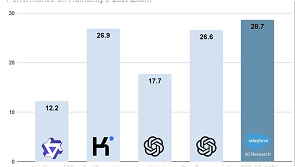
Dear Readers,
Sometimes it feels as if the world of AI is reinventing itself on a weekly basis—no sooner have we gotten used to one innovation than the next wave is already upon us. From models that no longer just provide ideas but generate entire files, to agents that independently research and plan: the boundary between humans and machines is shifting noticeably. The question is no longer whether AI is changing our everyday lives, but how deeply it is embedded in our work and our thinking.
In this issue, we take a look at precisely this dynamic: Claude, which is now evolving from a text generator to a true producer; Baidu's ERNIE X1.1 with ambitious performance values; ByteDance's Seedream 4.0, which takes images to a new level; and SFR-DeepResearch, which redefines autonomous research. In addition, there are exciting highlights on Microsoft's and Google's strategies, new benchmarks, and fresh experiments from the scene. Each topic shows how the playing field is shifting—together, they paint a picture of a technology that is almost unstoppable. So stay tuned, because what sounds like the future today could be standard tomorrow.
In Today’s Issue:
🤑 Claude can now create and edit files like Excel, Word, and PowerPoint directly in chat
💵 Baidu just released ERNIE X1.1, a powerful new AI model from China
📈 ByteDance's new Seedream 4.0 is a breathtaking multimodal image AI
📉 Autonomous AI agents are getting smarter, capable of planning, searching, and coding on their own
✨ And more AI goodness…
All the best,

Claude's Spreadsheet Mastery
A user has lauded Claude's new ability to work with Excel, praising its capacity to create complex spreadsheets with hundreds of formulas from a single prompt, calling it the best they've seen so far.
Gemini API Gets Major Video Upgrades
Google has rolled out three major AI updates for developers, including the production-ready Veo 3 and Veo 3 Fast models, enabling the creation of high-quality 1080p HD videos in both 16:9 and 9:16 aspect ratios via the Gemini API.
Open-Source Clinical AI Data Released
OpenMed AI Community has released MultiCaRe, a new open-source, multimodal clinical case dataset on Hugging Face, featuring over 160,000 images and 85,000 de-identified patient narratives and medical article abstracts.
How AI will change the economy over the next 18 months—with Anthropic CEO Dario Amodei
The Takeaway
👉 Anthropic elevates Claude from pure text generation to real output production with “Create Files.”
👉 Users can create and export Excel sheets, Docs, or Slides directly in chat.
👉 The Files API makes the feature scalable for developers and integrable into workflows.
👉 This makes AI more of a tool for concrete work results rather than just a source of ideas.
The boundary between chat and workplace is disappearing: Claude can now build and edit files—from financial models to pitch deck slides. You describe what you need, upload data, and get back finished Excel sheets with formulas, Word/Google Docs, PowerPoint decks, or PDFs—directly in Claude.ai or the desktop app. For teams, this means less copy-pasting, faster iterations, and clear handovers. And for developers, there's the Files API: upload once, use multiple times, pull outputs programmatically. This turns the bot from an idea generator into an actual producer – more like a colleague in operations than just a text generator.
Why is this so exciting? Because many workflows today fail due to media breaks: chat response → manual implementation → correction loops. “Create Files” brings these steps into a single dialog. Budget trackers with auto-calculations, ad hoc reports, sales analyses – all promptable and immediately usable as files, including export to GDrive. Sounds like a gimmick? It was yesterday. Today, it's a productivity lever. Which task will you delegate first?
Why it matters: This feature shifts AI from “providing ideas” to “providing assets” – measurable output instead of mere suggestions. Standardizing workflows early on (prompts, templates, review steps) scales quality and saves real hours.
Sources:
🔗 https://www.anthropic.com/news/create-files
🔗 https://docs.anthropic.com/en/docs/build-with-claude/files

Coupon Extensions Hate Us (And You’ll Love Why)
Coupon Protection partners with DTC brands like Quince, Blueland, Vessi and more to stop coupon extensions from auto-applying unwanted codes in your checkout.
Overpaid commissions to affiliates and influencers add up fast – Take back your margin.
After months of using KeepCart, Mando says “It has paid for itself multiple times over.”
Now it’s your turn to see how much more profit you can keep.
WebExplorer is a new training method for web agents with long planning horizons. Instead of rigid, predefined graphs, it relies on model-based exploration to generate high-quality training data. The result: the 8B model outperforms significantly larger models (32B–72B) in benchmarks such as BrowseComp and HLE.

ERNIE X1.1 just launched!
The Chinese company Baidu has released a new version of its ERNIE model. X1.1 performs well, but does not surpass the current top models from OpenAI, Anthropic, or Google.
”ERNIE Achieves significant performance gains over ERNIE X1, with factual accuracy up 34.8%, instruction following up 12.5%, and agentic capabilities up 9.6%
In benchmark evaluations, it surpasses DeepSeek R1-0528 and performs on par with GPT-5 and Gemini 2.5 Pro
Built on the foundation of ERNIE 4.5, the model is enhanced with extensive mid-training and post-training, including end-to-end reinforcement learning.
Seedream 4.0 released
Seedream 4.0 is the latest edition of ByteDance's image AI family. Unlike its predecessors, it is a multimodal model that offers image generation (text → image), image editing, and even the creation of multiple related images simultaneously from a single source. The image quality is breathtaking!
SFR-DeepResearch
SFR has introduced a new generation of autonomous research agents with SFR-DeepResearch (SFR-DR). The models—such as the 20B model—can plan, search, browse, and code independently, achieving 28.7% on Humanity's Last Exam (text-only), which is better than OpenAI o3 and Kimi Researcher.



















